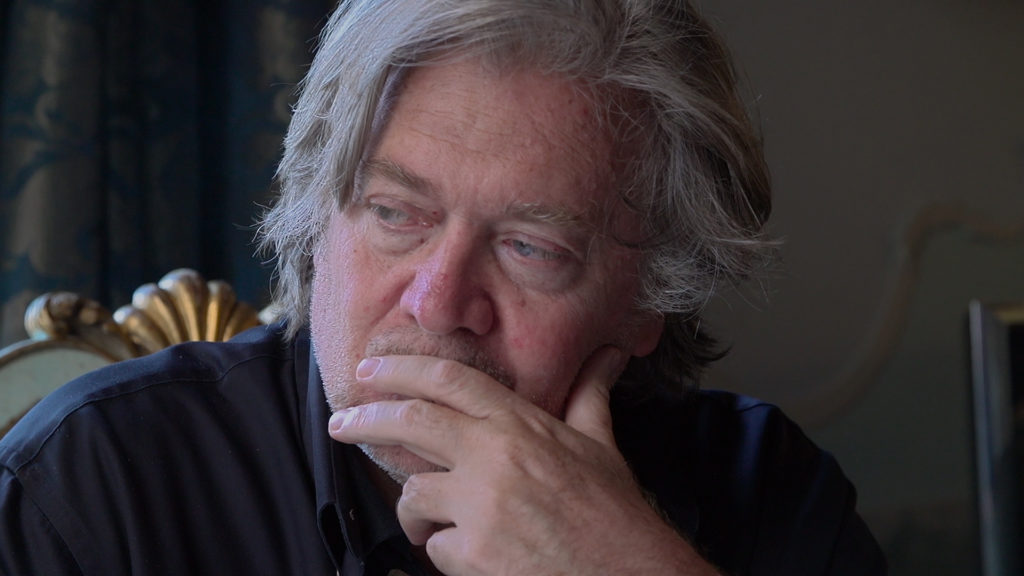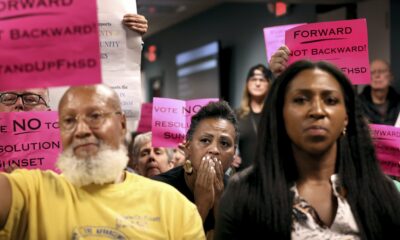Culture & Media
Steve Bannon Returns to the Spotlight in a New Documentary
The Brink follows the former White House adviser speaking at rallies and huddling with neo-Nazis across the globe.

Director Alison Klayman’s acclaimed 2012 feature documentary, Ai Weiwei: Never Sorry, began with the film’s eponymous Chinese artist/activist talking about how one of his many cats had learned to open a door. Klayman was surely making the analogy between the cat and that film’s subject, who unlike most Chinese public figures, refused to accept the status quo. Seven years later, documentary producer Marie Therese Guirgis sought her out to helm a film about a whole other type of animal. The producer had convinced one of her former work colleagues, Steve Bannon, to let the two women turn their cameras on the former chairman of Breitbart News, who at the time was a close adviser to President Donald Trump.
The end result is The Brink, a follow-doc in which Klayman’s subject speaks at rallies, huddles with neo-Nazis across the globe and even loses his mind when things don’t go his way. Bannon is no Ai Weiwei, but The Brink succeeds in somewhat humanizing a man bent on promoting dehumanizing policies; the film emerges as a cautionary tale about a disheveled danger lurking in our midst. Bannon isn’t quite a cat that opens doors. He’s more like a guy who wants to keep doors closed so that he and his fellow fat cats can maintain their privileges and power. Capital & Main sat down with Klayman and Guirgis recently to discuss The Brink, which opens today in Los Angeles and New York.
Alison, I went back and read reviews of your Ai Weiwei doc and some of them are sexist in the way that writers described you and how they assessed your work. Do you think it helped this documentary for you to be women?
Guirgis: I don’t even find [Bannon] particularly misogynist, honestly. I mean, I’ve worked with a lot of progressive men who are far more misogynist. But I think that people in general underestimate women, particularly young women.
Klayman: I always try to come in and wear all black — I’m trying to be as quiet as possible. I’m not really playing into a specific persona, but I do think that it helps to be underestimated.
Marie, you knew Bannon from before, in Hollywood. How has that relationship changed over the years?
Guirgis: When he joined the Trump campaign, I was very upset and disturbed because at the time that I knew him, I actually liked him quite a bit, even though he had a terrible temper. He was in some ways a mentor to me professionally. So, to see this was deeply disturbing and upsetting. I got back in touch with him basically to tell him that. I just repeatedly sent him what were kind of angry and cathartic emails and texts, for me, and he would answer politely.
“If he’s [mobilizing] neo-Nazis in Europe, what does it matter if he doesn’t wake up every day thinking,
‘I hate black people’?”
So, I kind of had it in the back of my head, for a while, that I’ve got this access, and if he’s going to answer me even during the middle of the presidential debate, I have to be able to do something with this. One day I woke up and thought, I can make a documentary about him. So, I reached out. He said no a few times, very emphatically. He said, “You’ll destroy me.” And then to my surprise, one day, while he was still in the White House, he just said, “I’ll do it.”
So do you think that shift in him, in terms of his politics, was a shift of convenience or a true shift in ideology?
Guirgis: It certainly began as opportunistic. I saw him become a filmmaker. He made his first film when I worked for him and he got a lot of positive attention that he wouldn’t have gotten on the Left. That’s how he met [Andrew] Breitbart. Steve came in as a financial guy. Then he kind of inserted himself ’cause that’s sort of what he does. The next thing you know he has some kind of title that you’ve never heard of, like executive chairman or something.
He saw himself becoming a big fish in a small sea – whereas he never became the big fish in the big sea of Hollywood. I would say that opportunism was and probably is a big part of what drives him, but I do think that there was–and I had to come to terms with this myself–some sort of genuine turn towards the far right, and that’s real. He has a healthy ego, he likes attention. I think people forget he’s an investment banker. He’s all about transaction, success, winning, so the opportunism is combined with a desire to win.
As a transactional guy, is it possible that his policies are racist policies but he’s not a racist? In other words, could it simply be a means to an end?
Guirgis: Does it matter? The result is the same. It’s not a snide answer. I had to deal with this every day. I’m someone who knew him, who liked him, right? But if he’s literally [putting together and mobilizing] neo-Nazis in Europe, then really what does it matter if he doesn’t wake up every day thinking, “I hate black people”?
“I don’t know if he’s quite aware of the fact that look, you’re never fully an outsider when you’re a middle-class, white, Christian male.”
The other issue that is important in this film, is that I think people wanted him say the N-word or be hostile to a black candidate, and the fact is not everyone who does and espouses racist beliefs or does things to promote racism and anti-immigrant sentiment, xenophobia or anti-Semitism acts like that all the time. There’s a difference between the extreme white supremacists, in terms of their everyday kind of behaviors and words, and someone like Bannon. But I would say to some degree, and I don’t want to be inflammatory, the end result is similar, right?
Klayman: And personally, part of my definition of a racist would be someone who architects the Muslim travel ban.
He seems to be such a dichotomy. He’s a disheveled schlub, but he’s also somewhat charming. He thinks he’s intellectual, but he hates intellectuals.
Guirgis: I think he’s someone who’s always felt somewhat like an outsider, wherever he was. And had a bit of chip on his shoulder. Now I don’t know if he’s quite aware of the fact that look, you’re never fully an outsider when you’re a middle-class, white, Christian male. So, I think he was probably a good-looking somewhat popular, arrogant, obnoxious guy in high school, but who felt somehow that he deserved more and should be more.
Klayman: The thing that constantly surprised me, ’cause I didn’t know him from before, was that dichotomy of being really self-aware and also at the same time somehow being able to display a complete lack of self-awareness. That just maintained itself throughout the whole film.
Is he a revolutionary or simply a disruptor or an anarchist?
Klayman: Well, when I was trying to come up with takeaways and guiding principles in the edit, I had one line where I was like, “He’s not revolutionary, he’s a relic.” Because ultimately I don’t think any of his ideas are new. It’s the oldest story in the book. And that’s weird because also I think he wants to see himself as a revolutionary and in the vanguard.
If he’s simply a relic, does his movement have any real prospects?
Klayman: Yes, definitely. If I didn’t think it was a danger, what’s the point of making the film ?
Where do you think Steve Bannon will be 10 years from now?
Klayman: What does the movie make you think?
I think he will be a fringe character. Like a cable news pundit. But the film is also a bit of a cautionary tale…
Guirgis: Yeah — it’s where do we allow him to be in 10 years.
Klayman: It’s where are we in 10 years? And also remember: He is a millionaire funded by billionaires. In 10 years, are there still going to be billionaires who want to fund his activities? Probably, right?
Copyright Capital & Main
-

 Latest NewsApril 8, 2024
Latest NewsApril 8, 2024Report: Banks Should Set Stricter Climate Goals for Agriculture Clients
-

 Latest NewsApril 22, 2024
Latest NewsApril 22, 2024Oil Companies Must Set Aside More Money to Plug Wells, a New Rule Says. But It Won’t Be Enough.
-

 Striking BackMarch 25, 2024
Striking BackMarch 25, 2024Unionizing Planned Parenthood
-

 California UncoveredApril 9, 2024
California UncoveredApril 9, 2024700,000 Undocumented Californians Recently Became Eligible for Medi-Cal. Many May Be Afraid to Sign Up.
-

 Feet to the FireApril 22, 2024
Feet to the FireApril 22, 2024Regional U.S. Banks Sharply Expand Lending to Oil and Gas Projects
-

 Class WarMarch 26, 2024
Class WarMarch 26, 2024‘They Don’t Want to Teach Black History’
-

 Latest NewsApril 10, 2024
Latest NewsApril 10, 2024The Transatlantic Battle to Stop Methane Gas Exports From South Texas
-

 Latest NewsApril 23, 2024
Latest NewsApril 23, 2024A Whole-Person Approach to Combating Homelessness




















